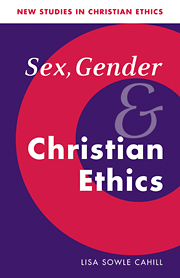Book contents
- Frontmatter
- Contents
- General editor's preface
- Acknowledgments
- 1 Sex, gender, and the problem of moral argument
- 2 Feminism and foundations
- 3 Particular experiences, shared goods
- 4 “The body” – in context
- An interlude and a proposal
- 5 Sex, gender, and early Christianity
- 6 Sex, marriage, and family in Christian tradition
- 7 The new birth technologies and public moral argument
- Concluding reflections
- Notes
- Index
- New Studies in Christian Ethics
1 - Sex, gender, and the problem of moral argument
Published online by Cambridge University Press: 05 June 2012
- Frontmatter
- Contents
- General editor's preface
- Acknowledgments
- 1 Sex, gender, and the problem of moral argument
- 2 Feminism and foundations
- 3 Particular experiences, shared goods
- 4 “The body” – in context
- An interlude and a proposal
- 5 Sex, gender, and early Christianity
- 6 Sex, marriage, and family in Christian tradition
- 7 The new birth technologies and public moral argument
- Concluding reflections
- Notes
- Index
- New Studies in Christian Ethics
Summary
Sexual identity and behavior and gender roles are intimate components of the ordinary life of every human being. Thus, normative interpretations of sex and gender have a potentially enormous significance for all of us. This is particularly the case when they are backed by heavy social or psychological sanctions, as they have been in traditional Christian teaching about the proper hierarchy of gender, and about sexual sin. Sex and gender are so controverted today because the rigidity and stringency of their traditional moral presentation has collided head-on with historicized or “postmodern” interpretations of moral systems. The latter select sexual norms as an example par excellence of culturally relative assumptions parading as timeless absolutes. In particular, feminist critiques have suggested provocatively that the social control of women is a major motivation underlying a high proportion of traditional Christian sexual morality.
This project is sympathetic to these critiques. Yet, as I will also argue, Christian morality can fund strong criticism of sexual and reproductive behavior, gender expectations, and family forms which dominate women. But the fundamentally egalitarian inspiration of Christianity is perennially liable to perversion by powerful authorities interested in maintaining their status. This book is thus written from a feminist perspective, by which is meant simply a commitment to equal personal respect and equal social power for women and men. This does not necessarily mean that the sexes have no innate differences; it does mean such differences – whatever they may be – will not be accepted as warrants for social systems which grant men in general authority and power over women in general.
- Type
- Chapter
- Information
- Sex, Gender, and Christian Ethics , pp. 1 - 13Publisher: Cambridge University PressPrint publication year: 1996



